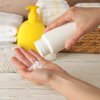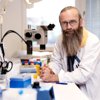Fritextsökning
Artiklar per år
Innehållstyper
-

Uncertainty about the government’s life science work
The government’s national coordinator for life science, Jenni Nordborg, left her position almost four months ago. No one has yet succeeded her, and now questions are being raised both about the government’s plans for the office and the Swedish life science strategy.
-

New drug alert in the US: Rise in overdoses linked to the use of drugs for animals
A combination of the synthetic drugs fentanyl and xylazine, an animal tranquilizer, has been labelled a “growing threat” by the White House due to its role in the ongoing opioid crisis in the US.
-

Nytt droglarm i USA: Ökning av överdoser kopplas till användning av läkemedel för djur
En kombination av den syntetiska drogen fentanyl och xylazin, ett lugnande medel avsett för djur, har av Vita Huset stämplats som ett "växande hot" på grund av sin roll i USA:s pågående opiodkris.
-

Elypta awarded one million USD from the Star Trek creator’s foundation
Swedish company Elypta, which develops methods for early cancer detection, has been awarded one million USD from an unexpected source: a foundation set up in memory of the creator of Star Trek.
-

Uppgörelse om babypuder kan kosta 90 miljarder för läkemedelsjätten
Den amerikanska läkemedelsjätten Johnson & Johnson erbjuder 8,9 miljarder dollar, motsvarande över 90 miljarder kronor, i förlikning efter att man stämts av tiotusentals personer, som hävdar att bolagets babypuder orsakar cancer.
-

Conference on Alzheimer’s reveals several advances in the field
In Gothenburg, Sweden, researchers and pharmaceutical companies from all over the world gathered to discuss one specific issue – neurological diseases. Life Science Sweden has talked to some of those that attended the conference.
-

Life Science Swedens förlag lanserar branschkurser
Branschtidningsförlaget Nordiske Medier, där Life Science Sweden ingår, erbjuder nu utbildningar.
-

Fem saker du måste veta om AI 2023
Är ditt jobb hotat av maskininlärning? Varför är det viktigt att hänga med i utvecklingen inom artificiell intelligens? Här får du svar på vad du behöver veta om AI just nu.
-

Positiv jobbprognos inom life science
Trots tuffa tider är sysselsättningsprognoserna inom hälso-, sjukvårds- och life science-branscherna fortsatt optimistiska, visar en ny marknadsbarometer från Manpower.
-

Bananflugor äter för njutningens skull
Har du också irriterat dig på de små ljusbruna flugorna i köket? Nu är det klarlagt – de roar sig och har kul där i fruktskålen.
-

Företag i Kanada får börja tillverka kokain
Ett företag i den kanadensiska provinsen British Columbia har fått tillstånd att tillverka och sälja kokain på licens.
-

Nästa generation AI kan bli OI
I höstas presenterades hur mänskliga hjärnceller i en odlingsskål lärt sig att spela Dishbrain, en variant av tv-spelet Pong. Nu tas nästa steg.
-

The Swedish National Board of Health and Welfare rejects prioritising andrology as a speciality
Male infertility can be linked to a shorter lifespan and several severe diseases, but when couples who want children are examined, the focus is on the woman. Experts in the field claim that andrology needs to become a speciality in Sweden to increase awareness and knowledge. But the Swedish National Board of Health and Welfare says that it is not a priority.
-

“An entire industry is about to be wiped out”
According to Jennie Ekbeck, CEO of Umeå Biotech Incubators, Sweden risks not having any small diagnostic companies left in five years.
-

How critical are the “Spermageddon” reports? – Researchers call for action
A much talked about meta-study indicates that sperm concentration in men’s seminal fluid has halved in 40 years. Experts in andrology that Life Science Sweden speaks to believe that the results must be taken seriously, and call for action from the Swedish authorities.
-

Column: ”Life as a F1 race”
"The F1 car makes several pit stops during a race and during a lifetime the human being may also have to come in several times for maintenance", Björn Ursing writes in a column.
-

Editorial: ”AI that both impresses and frightens”
”In the past, I've rarely been particularly impressed by something that was produced by AI. But this is something completely different”, Samuel Lagercrantz writes in an editorial.
-

Hello Jenni Nordborg!
Life Science Sweden would like to know more about Jenni Nordborg and asks her about her new job, why she became a chemical engineer and who her role model is.
-

Rapid development in blood analysis – “Sweden is leading the race”
Thousands of analytical tests using just one single drop of blood. What was revealed as a hoax just a few years ago is now a reality, according to KTH professor and serial entrepreneur Mathias Uhlén.
-

AI hjälper till att kartlägga biologiska processer
Forskare vid Göteborgs universitet har med hjälp av AI i detalj kartlagt på vilket sätt celler och partiklar rör sig i levande materia. Studien presenteras i det senaste numret av Nature Machine Intelligence.
-

Amerikansk tidning stämmer EU-kommissionen för "mörkade" vaccin-sms
EU:s vägran att lämna ut en sms-konversation mellan Pfizers ledning och EU-kommissionens ordförande Ursula von der Leyen i samband med ett gigantiskt vaccinkontrakt blir nu föremål för rättslig prövning.
-

Individual DNA passport could result in fewer drug side effects
You may be required to show a DNA passport when you pick up medicines at the pharmacy in the future. According to a new study, patients might suffer 30% fewer side effects if the drug treatment is adapted to their genes.
-

Column: ”We need to exploit the benefits of the regulations“
You don’t need to search long on the Internet to find lists of the most innovative countries with Sweden ranking at the top. Sweden generally offers good conditions for growing new solutions, but it is also becoming increasingly clear that we are challenged in one area – regulations, writes Björn Arvidsson in a column.
-

"Unclear proposal from the EU Commission on how to solve the MDR challenges"
Even before the EU regulation on medical devices (MDR) came into force, medical technology companies and doctors were concerned that it would endanger the availability of medical devices in the EU. Unfortunately, the fears have come true.